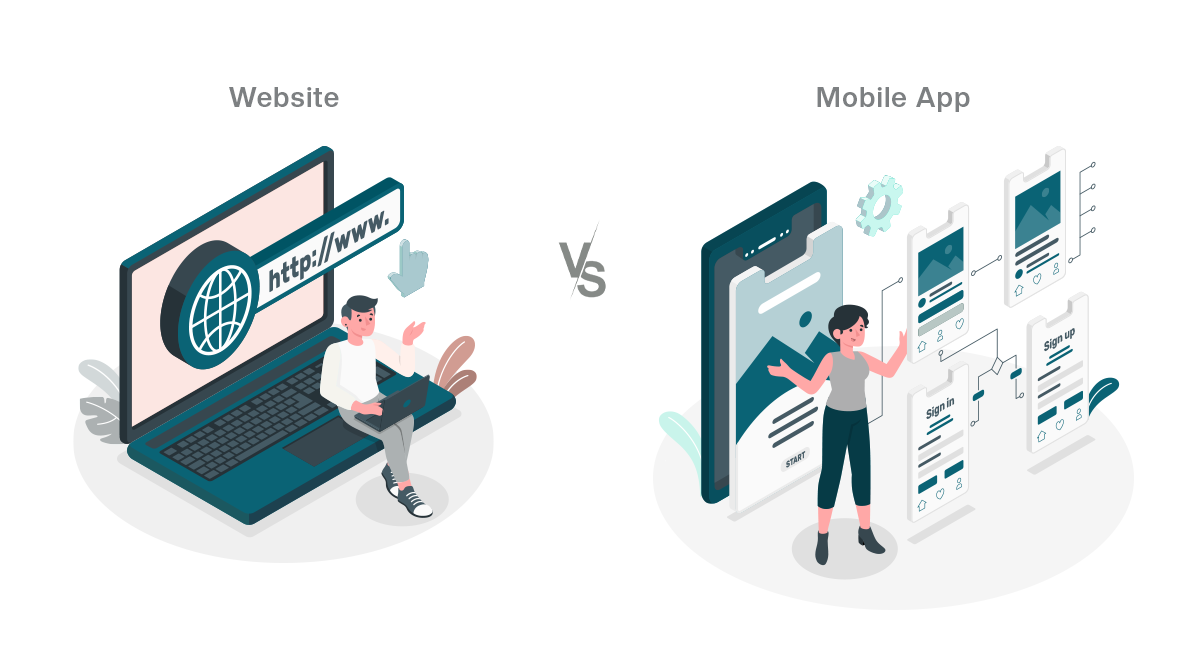Today, businesses must establish a strong online presence to stay competitive. One of the fundamental decisions entrepreneurs face is whether to invest in a website, a mobile app or both. This choice depends on various factors including business goals, target audience, budget, and functionality requirements. While websites offer broad accessibility and are essential for online visibility, mobile apps provide a more personalized and interactive experience. Understanding the strengths and limitations of each option is important for making an informed decision that aligns with your business objectives. This guide by WebsCare will help you navigate the decision-making process to determine whether a website or a mobile app is the right choice for your business.
Looking for best app development services in Pakistan? Get the best solutions with our two premium options.
Understanding Difference Between Websites and Mobile Apps
Learn the key differences between websites and mobile apps, their unique benefits, and how to choose the right platform for your needs.
Websites
A website is a collection of web pages accessible through a browser on any internet-connected device. Websites can be static (informational) or dynamic (interactive) and are generally built using HTML, CSS, and JavaScript. Here is the list of some features of Websites:
- Accessible through a web browser on any device (desktop, laptop, tablet, smartphone).
- Relatively quicker and less expensive to develop and maintain.
- Ideal for providing information, marketing and basic online transactions.
- Relies on internet connectivity.
- Can be optimized for responsive design to adapt to different screen sizes.
Mobile Apps
A mobile app is a software application designed to run on smartphones and tablets. Apps are typically developed for specific operating systems like iOS (Apple) and Android (Google). They offer enhanced interactivity and can leverage device-specific features such as GPS, cameras and push notifications.
- Downloaded and installed on mobile devices (smartphones, tablets).
- Offer a more personalized and interactive user experience.
- Can use device features like GPS, camera and push notifications.
- Can function offline (depending on the app’s functionality).
- Generally, more expensive and time-consuming to develop and maintain.
- Require ongoing updates and platform compatibility.
Why Mobile Apps are essential for business growth? Let’s read more about it.
Key Factors to Consider for Choosing Between a Website and a Mobile App
Here is the list of some key factors to consider for choosing between a website and a mobile app for your business, mentioned as:
Business Goals and Objectives
If your primary goal is to provide information, a website is often the best choice. It is accessible from any device with an internet connection and can be easily updated. But, if you aim to offer a personalized and immersive user experience (e.g., gaming, social networking, or e-commerce with frequent interactions), a mobile app might be more suitable.
Target Audience and User Behavior
If your users prefer quick access without downloading an app, a website is the way to go. If your audience is likely to use your services frequently, a mobile app can enhance engagement through personalized features and offline access.
Cost and Development Complexity
Websites are generally more cost-effective to develop and maintain compared to mobile apps. A responsive website ensures accessibility across all devices without additional development for different operating systems. Mobile apps require separate development for iOS and Android, which increases costs. They also demand ongoing updates to maintain compatibility with OS updates and new device features.
User Experience and Performance
Websites rely on internet speed and browser compatibility which may impact performance. Mobile apps offer better performance especially for complex functionalities like gaming, streaming and e-commerce. Apps allow businesses to send push notifications, encouraging user engagement and retention. Websites, while more accessible, may lack the interactive and immersive experience that an app provides.
Offline Functionality
Websites typically require an active internet connection to function since they rely on real-time data fetching from remote servers, meaning users cannot access them without connectivity unless they use Progressive Web Apps with limited offline capabilities. In contrast, mobile apps can store data locally on the device, allowing users to access certain features such as viewing cached content, editing documents, or playing downloaded media, even when offline, enhancing convenience and usability. Once reconnected, this app can sync local changes with the server, providing a whole experience. This offline functionality makes mobile apps more reliable in areas with poor internet, improves performance by reducing dependency on constant data retrieval and ensures uninterrupted access to key features, unlike traditional websites that fail to load without an internet connection.
SEO and Discoverability
Websites benefit from search engine optimization (SEO), making them easily discoverable on Google and other search engines. But, mobile apps depend on app store optimization, where visibility is determined by factors like app title, description, ratings and downloads within platforms like the Google Play Store or Apple App Store. While websites can attract traffic naturally through SEO, apps often require additional marketing efforts (such as ads or influencer promotions) to improve discoverability, as they don’t appear in traditional search engine results unless linked to a website.
Push Notifications and Engagement
Mobile apps can send push notifications, keeping users engaged and informed about updates, promotions or personalized content. Websites can use email marketing and browser notifications but are less immediate than push notifications. As a result, mobile apps excel in keeping users engaged with real-time updates, promotions and personalized content while websites struggle to match the same level of immediacy and re-engagement potential.
When to Choose a Website
Here are some reasons why we need to choose a website for business, listed as:
When to Choose a Mobile App
Here are some reasons why we need to choose a Mobile App for business, listed as:
The Best of Both Worlds: Progressive Web Apps
For businesses seeking a balance between a website and a mobile app, a Progressive Web App offers a compelling alternative. PWAs provide app-like experiences within a browser, offering offline functionality, push notifications, and improved performance without requiring a traditional app download.
Searching for the best web development tools? Let’s find the top 8 tools to optimize your workflow and enhance productivity!
Conclusion
Choosing between a website and a mobile app depends on your business objectives, audience preferences, budget and required features. In this thorough article, our WebsCare research team has compiled all the important reasons to choose between a website and a mobile app for your business. If accessibility and cost-effectiveness are your priorities, a website is a better option. If engagement, interactivity and offline access are important, a mobile app is the way to go. Combining both, possibly through a PWA, provides the best solution for some businesses.


